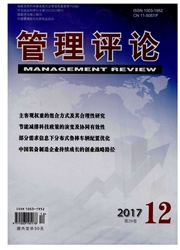

 中文摘要:
中文摘要:
文献回顾发现几乎所有采用中国样本的心理授权研究中,影响力(心理授权维度)与积极结果变量之间都没有正关联,与西方研究中影响力的积极效用形成了明显对比。结合权力距离理论和心理授权理论提出中国高权力距离文化易于使员工影响力遭受组织社会政治系统的排斥,进而,在员工知觉到这种排斥的情况下将产生消极影响。在两个样本的研究中,以离职意向和工作倦怠为结果变量,LMX和领导绩效评价为调节变量。结果如理论预期,影响力并不能产生降低离职意向和工作倦怠的积极效应,反而在调节变量的低水平上表现出消极作用。研究在说明影响力因子的效应与西方不同的同时,更说明了表达影响力的员工不易为管理者所接纳在中国具有普遍性,从而为追求高水平授权的企业克服传统文化因素的阻碍提供了启示。
 英文摘要:
英文摘要:
By carefully examining the results in the existing psychological empowerment studies that use Chinese samples,we find that impact( one of the dimensions of psychological empowerment) typically does not associate with positive outcome variables. This is in stark contrast to the findings in western societies. In light of power distance theory and psychological empowerment literature we propose that in Chinese high power distance cultural context,employees' impact is likely to be resisted by organizations' sociopolitical system and therefore will manifest negative rather than positive effects when boundary condition is matched. We conduct two empirical studies which test impact's effects on turnover intention and job burnout,and two moderators'( LMX and leader's performance evaluation)moderating effects on these relationships. The results show no beneficial effects of impact on turnover intention and job burnout,rather,manifest deteriorating effects on turnover intention and burnout when the moderators are at low level. The findings indicate that impact functions differently in China comparing with the west. It also demonstrates that managers in Chinese organizations usually dislike employees with high impact,and this finding has useful implications for practitioners to pursue effective empowerment by overcoming the encumbrance from the traditional cultural factor.
 同期刊论文项目
同期刊论文项目
 同项目期刊论文
同项目期刊论文
 期刊信息
期刊信息
